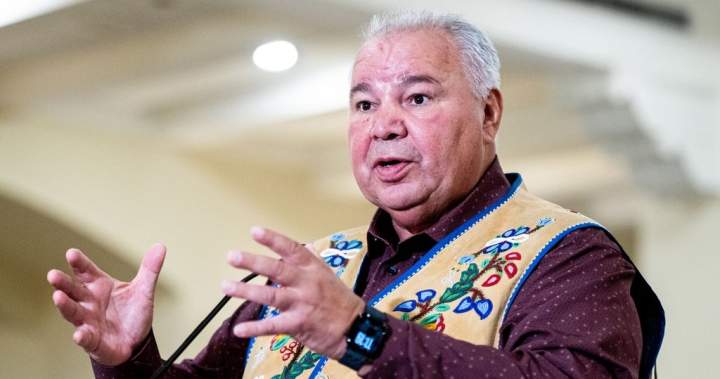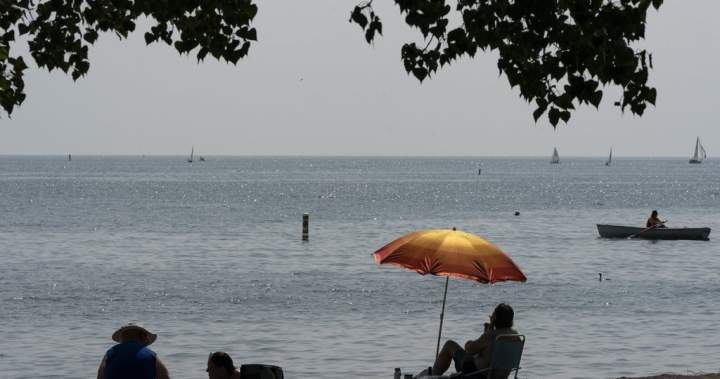Uncategorized
Ford government to appeal court ruling which deemed bike lane removal unconstitutional

The Ford government says it will appeal a court ruling which found its plan to tear out dedicated bike lanes in Toronto is unconstitutional.
On Wednesday afternoon, a government spokesperson confirmed they would be appealing the ruling — handed down earlier in the day — which said removing bike lanes from Bloor Street, Yonge Street and University Avenue would “breach” the Charter.
In his ruling, Superior Court Justice Paul Schabas said the province’s move to take out bike lanes would be “inconsistent” with the constitutional protection of life, liberty and security.
The ruling said an updated version of the law, passed in June and requiring bike lane reconfiguration instead of removal, would also breach the charter.
“Any steps taken to ‘reconfigure’ the target bike lanes that removes their protected character for the purpose of installing a lane for motor vehicles in order to reduce congestion, would be in breach of s. 7 of the Charter,” the ruling said.
The Ministry of Transportation said the Ford government would appeal.
“We were elected by the people of Ontario with a clear mandate to restore lanes of traffic and get drivers moving by moving bike lanes off of major roads to secondary roads,” they said in a statement.
“To deliver on that mandate, we will be appealing the court’s decision.”
Months of bike lane battles
The ruling comes after months of legal wrangling and a court-imposed injunction that has, so far, prevented the province from following through on its promise to remove bike lanes from Toronto’s Bloor Street West, Yonge Street and University Avenue.

Get breaking National news
For news impacting Canada and around the world, sign up for breaking news alerts delivered directly to you when they happen.
In an earlier injunction ruling, Justice Schabas cited the public interest in protecting cyclist safety and a lack of evidence backing the government’s claim that removing the lanes would reduce congestion.
The original legislation — Bill 212 — was fast-tracked through the Ontario legislature in late 2024.
It gave the province the power to assess cities’ plans to install bike lanes moving forward and review infrastructure that had been added in the past half-decade.
It allowed Ontario to reverse the installation of bike lanes, specifically three major streets in Toronto.
A cyclists’ advocacy group immediately launched a Charter challenge, claiming the law was “ill-conceived and arbitrary” and would result in an increased number of injuries and deaths.
“This reckless legislative act infringes the rights of people who ride bikes, other road users, and/or pedestrians in the City of Toronto under s. 7 of the Charter by depriving them of life and security of the person contrary to principles of fundamental justice,” the court application, filed by CycleTO, claimed.
Ford has long pointed to “nasty, terrible” bike lanes as one of the sources of traffic congestion and has advocated for separated routes to be moved to secondary routes instead of arterial roads.
He has insisted he is not opposed to the infrastructure but believes it should not be added to major routes.
The Ford government’s 2025 budget included the removal of additional lanes on Avenue Road, effectively replacing the law passed at the end of 2024.
The revised law changed Ontario’s language from requiring the “removal” of specific bike lanes to “reconfiguring” them so an extra lane of traffic could be added back in.
In its court application, CycleTO claimed secondary roads “do not exist,” that there was “no rational connection” between the government’s gridlock-reducing intent and potential effect, and suggested that the government is aware of the potential harms.
Ruling chides lack of government evidence
In his ruling, Schabas said CycleTo had successfully argued that removing bike lanes would “put people at increased risk of harm and death” when they ride in the city.
“The evidence is clear that restoring a lane of motor vehicle traffic, where it will involve the removal of the protected, or separated, nature of the target bike lanes, will create greater risk to cyclists and to other users of the roads,” part of the ruling said.
It also said removing bike lanes would not help reduce congestion.
“The evidence shows that restoring lanes for cars will not result in less congestion, as it will induce more people to use cars and therefore any reduction in driving time will be short-lived, if at all, and will lead to more congestion,” the ruling said. “This makes the law arbitrary.”
It said the points offered by the government were “weak anecdotal evidence and expert opinion which is unsupported, unpersuasive and contrary to the consensus view.”
The ruling does not affect the parts of the law which require provincial approval for new bike lanes, which will remain in place.
In a statement, Toronto Mayor Olivia Chow’s office said she believed decisions about the locations of bike lanes should be made by local, not provincial, officials.
“Mayor Chow maintains that the City of Toronto and its elected council should be the ones making decisions about municipal infrastructure,” they wrote.
“Toronto City Council has voted to formally oppose the province’s plans to override the City’s authority and remove the lanes.”
© 2025 Global News, a division of Corus Entertainment Inc.
Uncategorized
Indigenous groups question government funding for Métis Nation of Ontario

First Nations in Ontario and the Manitoba Métis Federation say nearly $1 billion in federal funding went to a group they allege is fraudulently claiming Métis identity.
The Chiefs of Ontario, which represents 133 First Nations in the province, shared with The Canadian Press data on more than 20 years worth of federal funding provided to the Métis Nation of Ontario.
It suggests that $819,836,061 went from Ottawa to the MNO — an organization First Nations leaders say has no legitimacy and threatens their rights.
“This data shows just how badly First Nations in Ontario are being harmed by the diversion of government funding to the MNO and away from the needs of First Nations and other legitimate groups,” the Chiefs of Ontario said in a media statement.
“The question is, why is the Crown sending hundreds of millions of dollars to the MNO when there is overwhelming evidence contradicting their claims?”
The data indicates the money came from several federal departments, including Indigenous Services Canada, Crown-Indigenous Relations, Parks Canada and Environment and Climate Change Canada.
The MNO also received funds from the Canadian Nuclear Safety Commission and the Impact Assessment Agency related to the potential impacts of projects in their communities.
The conflict between First Nations, some Métis groups and the MNO stems from a 2017 decision by the government of Ontario to recognize six “new, historic” Métis communities in the province — and a 2023 federal government bill, which never passed, that would have affirmed the MNO’s right to self-government.
First Nations and other Métis groups say the communities represented by the MNO have no claim to Métis heritage and Ottawa and Ontario have no right to recognize them.

Last month, history professor Leila Inksetter of the University of Quebec in Montreal released a report drafted on behalf of the Wabun Tribal Council that concluded there is no evidence of a mixed-ancestry community in the Wabun Tribal Council’s territory in northeastern Ontario.
The MNO rejected that report, saying that despite years of outside attempts “to discredit” it, “nothing has changed.”

Get breaking National news
For news impacting Canada and around the world, sign up for breaking news alerts delivered directly to you when they happen.
“The facts of history will not change because a new ‘expert’ has been paid to peddle the same Métis denialism,” the group said in a media statement.
The MNO has cited a 2003 decision by the Supreme Court of Canada to recognize a Métis community in and around Sault Ste. Marie, Ont. The case did not consider the six new communities recognized in 2017, but rather what may constitute a Métis right.
Another report, published last month and commissioned by Saugeen Ojibway Nation, also concluded there is no evidence of a distinct Métis community in their territory in southwestern Ontario.
“The historical evidence simply does not support this claim,” says the nearly 200-page report, written by two historians at the University of Toronto.
While the report says there were “certainly individuals and families of mixed ancestry” in the region, that can’t form the basis of a claim to a distinct community within Saugeen Ojibway Nation territory.

Jennifer St. Germain, MNO chief strategy officer, said Métis and First Nations “should not be working at odds as we are not enemies.”
“We have worked together throughout our shared history to push colonial governments to respect the rights of Métis and First Nations peoples, to properly invest in the programs that matter to our families and communities, and to uphold the honour of the Crown,” she said.
“When the MNO and Ontario First Nations work together, we make real change for the better for our children, families, and communities, as well as our lands and waters.
“It’s time to get back to the table rooted in our shared values of honesty, truth, and respect.”
The Chiefs of Ontario says that the academic research “merely reaffirms reality.”
“Not only are Ontario and Canada refusing to consult First Nations, they refuse to share the research they relied on or acknowledge the growing body of research and take steps to fix their mistakes,” the Chiefs of Ontario said in a media statement.
“It is extremely disappointing that Canada and Ontario … failed to do any adequate research before recognizing the MNO.”
Open disputes over claims to Métis heritage came close last year to ripping apart the Métis National Council, which once acted as a national voice for Métis but now has just two provincial members.
The Métis Nation-Saskatchewan withdrew from the Métis National Council last September, citing concerns about the MNO and claiming the council had failed to ensure the integrity of its citizenship registry.

The Métis Nation British Columbia withdrew from the council shortly after, saying it had lost confidence in the council’s ability to serve as a national advocacy organization.
Their departure came years after the Manitoba Métis Federation withdrew from the council, citing similar concerns.
Will Goodon, the Manitoba Métis Federation’s minister of identity protection and inter-Indigenous affairs, said the amount of public money available to Métis communities is limited and should not be shared with bodies that are not connected to what he calls the historic Métis Nation — largely recognized as descendants of the Red River communities in Manitoba.
One Parks Canada grant received by the MNO was meant to allow the organization to secure land and “support creation of an ecological corridor in the region along the north shore of Lake Superior,” says a federal document.
Goodon said that type of funding raises red flags for both Red River Métis and First Nations concerned about the prospect of the MNO seeking land in their territories.

The Manitoba Métis Federation said it’s also troubled by the fact that the federal government last week invited MNO leaders to a meeting to discuss its controversial major projects legislation.
The federation, which boycotted that meeting, said the MNO’s invitation undermined the integrity of the gathering and put the government’s major projects agenda at risk.
“Canada and Ontario are pushing pro-development agendas. They say they will consult with ‘Indigenous communities’ but, in Ontario, the only consultations that should occur are with the rights holders — First Nations,” the Chiefs of Ontario said in a media statement.
“Pan-Indigenous approaches do not work and only devalue the true rights holders.”
© 2025 The Canadian Press
Uncategorized
Landlord says B.C. billionaire’s plan for Bay properties ‘defies commercial common sense’

Cadillac Fairview says a plan from a B.C. billionaire hoping to take over 25 former Hudson’s Bay leases “defies commercial common sense” and thus, she should not be allowed to move in.
In filings made with the Ontario Superior Court on Saturday, Cadillac Fairview says it is “resolutely opposed” to Ruby Liu becoming a tenant at some of its malls because she has no detailed or credible business plan.
The mall owner also says Liu, who owns three B.C. shopping centres herself, has no brand, experienced staff or track record in retail.
Her business is “an empty shell without any guarantee of financial means beyond Ms. Liu’s bare assertion that she will keep it afloat,” said Rory MacLeod, Cadillac Fairview’s executive vice-president of operations, in an affidavit. “All of the indications are that (her company) will run out of money before the first store opens.”
MacLeod’s affidavit ups the ante in a battle that has been festering between Liu and landlords since the Bay announced in May that it had chosen her to buy 28 of its leases. The first three got court approval and were transferred in short order because they were at Liu’s three malls.

The remaining 25, however, have been much more fraught. Those leases cover some of the country’s most prized retail space and came with cheaper rent and very attractive terms for the Bay, which filed for creditor protection under the weight of tremendous debt in March.
For example, the Bay paid $1.3 million in annual rent for 152,420 square feet at Fairview Mall in Toronto, court documents show, which is a fraction of what non-anchor tenants would pay.

Get breaking National news
For news impacting Canada and around the world, sign up for breaking news alerts delivered directly to you when they happen.
Unable to get most landlords onside with a lease transfer, the Bay asked a court at the end of July to force property owners to accept Liu as a tenant.
Liu and the Bay have until next Tuesday to respond to Cadillac Fairview’s allegations. A judge will hear the matter at the end of the month.
Liu has said she wants to turn the Bay stores she is hoping to buy into her own department store named after herself. She has repeatedly told The Canadian Press her stores will not just offer retail space but also dining, entertainment, kids play and recreation areas.
MacLeod says she’s also talked of outfitting Bay spaces with grocery stores, educational centres, senior’s facilities, robotics and musical performances.
Cadillac Fairview says leases at the six malls she wants from the company — Fairview Mall, Sherway Gardens, Masonville Place and Markville in Ontario, Market Mall and Chinook Centre in Alberta and Richmond Centre in B.C. — don’t allow for anything other than a department store to be operated there.

“Despite her private assurances that she intends to respect the lease terms, Ms. Liu has consistently presented a different idea to the public, one that would not be compatible with the leases,” MacLeod said.
His affidavit also raised concerns with the timelines and budget in her business plan.
Liu has said she will be ready to open at least 20 stores within 180 days of obtaining leases and will spend $120 million on “overdue” repairs to roofs, HVAC systems, washrooms, elevators and escalators and $135 million on initial inventory.
Cadillac Fairview says her proposed timeline is “entirely unrealistic” for a new brand, let alone an established one, and her plan is underfunded based on the high number of repairs properties need and expensive terms suppliers will require her to agree to.
MacLeod estimates the stores will need more than $15.8 million in repairs before the end of 2026 to bring the leases into good standing. By 2027, Liu will need to spend another $5.7 million on repairs, not including taxes, permits or fees for expedited labour.
Over the next 10 years, he estimates Liu will be required to spend at least $43.1 million on the Cadillac Fairview leases alone.
He also took issue with her staffing estimations, which show she will need 1,800 employees to carry out her plan.
If all 1,800 are sales staff that would only leave 64 people on the floor of each of her 28 stores. Macleod said such staffing levels are “inadequate to support a countrywide chain” and “inconsistent with a retail location even a fraction of that size.”
“With my decades of experience in commercial real estate, it is apparent to me and Cadillac Fairview that (Liu) will fail and again leave these stores vacant,” he said.
© 2025 The Canadian Press
Uncategorized
Heat warning issued for large part of Ontario, Quebec

A heat warning has been issued for a large part of Ontario and Quebec, with the hot weather expected to last multiple days, Environment Canada reports.
Daytime highs of 30 to 35 C are expected with the humidex values of 35 to 40 C.
Overnight lows will be cooler but will still hover between 19 to 22 C.

Get breaking National news
For news impacting Canada and around the world, sign up for breaking news alerts delivered directly to you when they happen.
Temperatures are expected to cool mid-week, which will start to bring an end to the heat, Environment Canada said.
The organization warns that extreme heat can affect everyone’s health and people should check on older adults, especially those living alone and other at-risk people.
Signs of heat exhaustion might include headache, nausea, dizziness, thirst, dark urine and intense fatigue.
Call 911 or your emergency health provider if you, or someone around you, is showing signs of heat stroke, which can include red and hot skin, dizziness, nausea, confusion and change in consciousness.
Environment Canada says heat warnings are issued when very high temperature or humidity conditions are expected to pose an elevated risk of heat illnesses, such as heat stroke or heat exhaustion.
© 2025 Global News, a division of Corus Entertainment Inc.
-

 Uncategorized2 months ago
Uncategorized2 months agoAccording to Dior Couture, this taboo fashion accessory is back
-

 Uncategorized2 months ago
Uncategorized2 months agoThese ’90s fashion trends are making a comeback in 2017
-

 Uncategorized2 months ago
Uncategorized2 months agoThe old and New Edition cast comes together to perform
-

 Uncategorized2 months ago
Uncategorized2 months agoUber and Lyft are finally available in all of New York State
-

 Uncategorized2 months ago
Uncategorized2 months agoNew Season 8 Walking Dead trailer flashes forward in time
-

 Uncategorized2 months ago
Uncategorized2 months agoMeet Superman’s grandfather in new trailer for Krypton
-

 Uncategorized2 months ago
Uncategorized2 months ago6 Stunning new co-working spaces around the globe
-

 Uncategorized2 months ago
Uncategorized2 months agoThe final 6 ‘Game of Thrones’ episodes might feel like a full season







